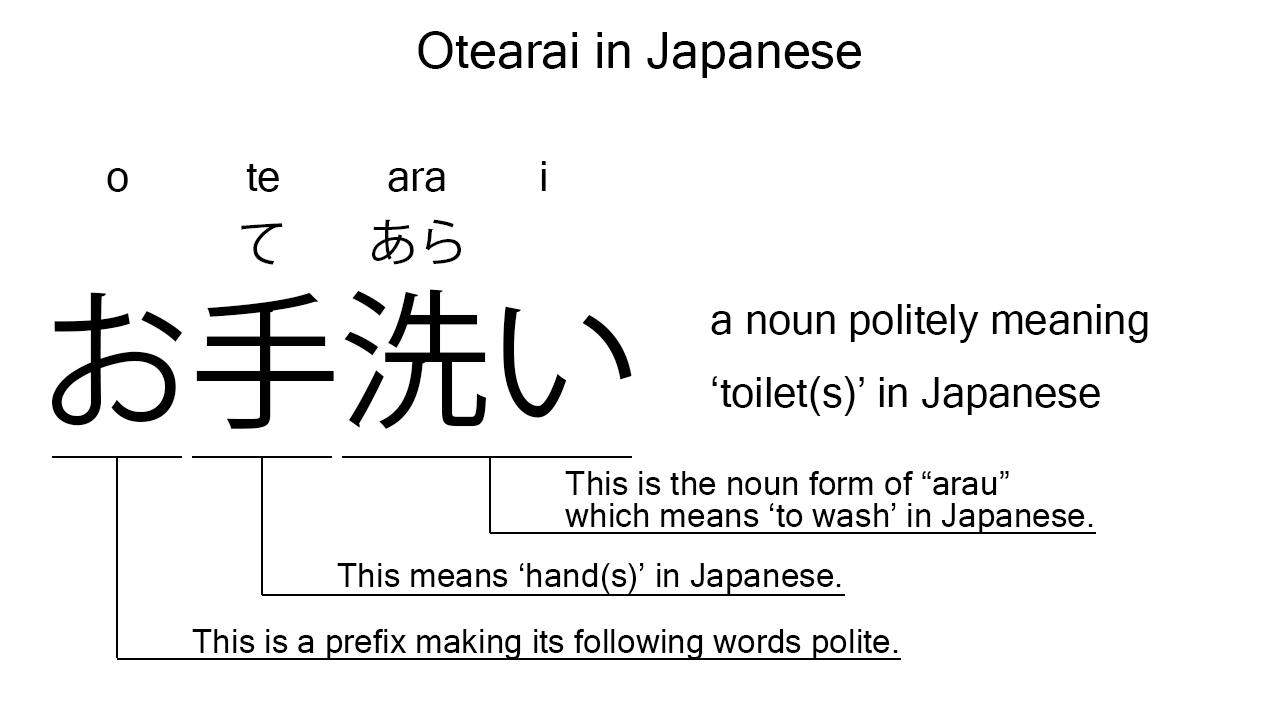What does “otearai” mean in Japanese?
Native speakers say “otearai” to mean ‘toilet’, ‘bathroom’, or ‘restroom’ politely in Japanese. Since it cannot refer to a room with a bathtub, we need to be careful with its use. It refers to the helpful chair-shaped object which we use every day or a room with that. Probably, some Japanese learners know this word as it is sometimes used in Japanese conversations. In this blog post, however, I will explain this word in detail based on its grammatical components. And also, I will explain how to use it through example sentences. My explanations would help Japanese learners understand “otearai” more clearly. Then, let’s get started!
Contents
Definition and meanings of “otearai”
Let me start with the definition and meanings of “otearai”.
- otearai – お手洗い (おてあらい) : a noun meaning ‘toilet’, ‘bathroom’, or ‘restroom’ politely in Japanese. This can also work as plural. Learn more about Japanese plural.
Japanese people use this noun to refer to the helpful chair-shaped object which they use every day or a room with that.
The definition and meanings are not that difficult, I think. To understand this noun more clearly, however, let me explain its grammatical components in detail, one by one.
What does “otearai” literally mean in Japanese?
“Otearai” consists of the following three components:
- o – お : a prefix making its following words polite.
- te – 手 (て) : a noun meaning ‘hand’ in Japanese. This can also work as plural.
- arai – 洗い (あらい) : a noun meaning ‘wash’ in Japanese. This can be considered as the noun form of the verb, “arau“, which means ‘to wash’ in Japanese. We can change Japanese verbs to their noun forms by replacing the last “u” sound with “i”. “Arai” is one typical.
These three components tell us that “otearai” is literally the Japanese polite expression for ‘hand wash’. This literal interpretation is not completely in line with the actual meanings, but represents well what Japanese people think. They consider a room with a toilet as a place where they wash their hands. In Japanese, polite expressions should be indirect. We can see this philosophy in the way they refer to a toilet or a room with it.

When we meet new Japanese words, we should check their grammatical components in detail to understand their meanings clearly and deeply. In many cases, components tell us a lot about the meanings of the words they form. Actually, here, we could get the better understanding of “otearai” through the detailed check above.
So far, I’ve explained the definition and meanings of “otearai” together with its grammatical components. Then, let me explain how to use it through the example sentences below.
Example #1: how to say “bathroom” in Japanese
otearai wa doko desu ka – お手洗いはどこですか (おてあらいはどこですか)
Where is the bathroom?
Below are the new words used in the example sentence.
- wa – は : a binding particle working as a case marker or topic marker. In the example, this works after “otearai” to make the subject in the sentence.
- doko – どこ : an interrogative pronoun meaning ‘where’ in Japanese. This is widely used to make where questions in Japanese.
- desu – です : an auxiliary verb used after a noun or adjective to make it polite. Probably, this is well known as a part of Japanese desu form. In the example, this is used after “doko” to make it sound polite.
- ka – か : a sentence-ending particle used to a make question. This is often used with the pitch raised. As the definition suggests, this is used at the end of the example sentence to make the question.
This is a typical usage of “otearai”. In this example, it works as a part of the widely-used phrase, “otearai wa doko desu ka”, which means ‘where is the bathroom?’ politely in Japanese. When we want to say “toilet”, “bathroom”, or “restroom” politely in Japanese, anyway, “otearai” is always a very good option.
Example #2: another usage of “otearai”
koko ga otearai desu – ここがお手洗いです (ここがおてあらいです)
Here is the bathroom.
Below are the new words used in the example sentence.
- koko – ここ : a pronoun used to refer to a place close to the speaker. In the example, this is used to mean ‘here’ in Japanese.
- ga – が : a case particle used to make the subject word or the object word in a sentence. In the example, this is used after “koko” to make the subject in the sentence.
This is another typical usage of “otearai”. Thanks to its politeness, this example sentence sounds polite and is suitable even for very formal situations.
Summary
In this blog post, I’ve explained the definition and meanings of “otearai” in detail based on its grammatical components. And also, I’ve explained how to use it through the example sentences. Let me summarize them as follows.
- otearai – 御手洗い (おてあらい) : a noun meaning ‘toilet’, ‘bathroom’, or ‘restroom’ politely in Japanese. This can also work as plural. This is literally the Japanese polite expression for ‘hand wash’. This literal interpretation is not completely in line with the actual meanings, but represents well what Japanese people think. They consider a room with a toilet as a place where they wash their hands. In Japanese, polite expressions should be indirect. We can see this philosophy in the way they refer to a toilet or a room with it.
Hope my explanations are understandable and helpful for Japanese learners.